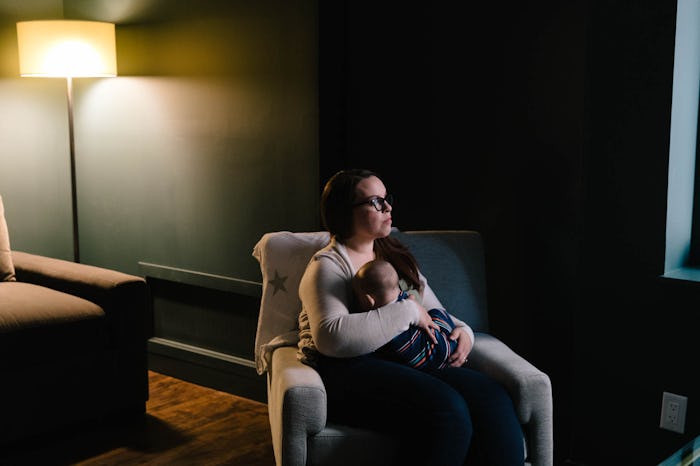Life
How Soon Can Postpartum Depression Start? Experts Weigh In
If there’s one thing I learned during my experience with postpartum depression (PPD), it’s that there is not a one-size-fits-all description. For me, I thought I might come up against the common symptoms of PPD — sadness, emptiness, an inability to bond with my baby — but what I experienced were some of the lesser talked about symptoms, also known as postpartum anxiety, like deeply rooted fear, racing thoughts, and worry that affected my daily activities. Panic attacks sent me to the emergency room twice. But what about timing? How soon can postpartum depression start? Turns out that, like the symptoms, it’s different for every woman.
“Women should expect to feel physically and emotionally more sensitive and vulnerable immediately after having a baby,” Dr. Sherry Ross, an OB-GYN and women’s health expert at Providence Saint John’s Health Center in Santa Monica, California tells Romper. “Anticipation, preparation, and acceptance are the key to sailing through the first couple weeks after delivery, especially if you are at risk for postpartum depression.”
What’s known as the “baby blues” — crying for no apparent reason, mood swings, and irritability — is common immediately following birth, the result of rapidly plummeting hormones combined with exhaustion and new-mom emotions, according to the American Pregnancy Association (APA). But those symptoms should only last a few minutes or hours of each day, and dissipate about two weeks after pregnancy.
PPD can start a few days after delivery or as late as a year, according to the APA. The difference with PPD is the severity and longevity of symptoms, like feeling sad, withdrawing from family and friends, and thoughts of hurting yourself or your baby.
Ross says a history of PPD can help you to create an action plan that includes preventative steps you can take during future pregnancies to avoid going through it a second time, including seeing a therapist and establishing a support team “who will help you be successful avoiding the dark days associated with depression.”
“The team should include your partner, therapist, and healthcare provider,” Ross says. “Women suffering from this type of depression need to acknowledge and be communicative on how they are feeling, and use their support team regularly.”
Take it from me — leaning on a support team is crucial during a struggle with PPD and related disorders. Depression and anxiety are incredibly isolating on their own, let alone with a small person to care for. It's hard to not feel like you are journeying down the road alone. But a helping hand to hold while traveling it, whether from a partner or professional, can truly make all the difference.
